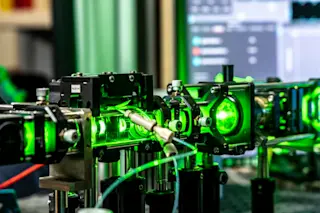1 There went our best chance: In the ninth century, a team of Chinese alchemists trying to synthesize an "elixir of immortality" from saltpeter, sulfur, realgar, and dried honey instead invented gunpowder. 2 German scientist Hennig Brand stored 50 buckets of urine in his cellar for months in 1675, hoping that it would turn into gold. Instead, an obscure mix of alchemy and chemistry yielded a waxy, glowing goo that spontaneously burst into flame—the element now known as phosphorus. 3 Soldiers supplied the raw material in vast, sloshing quantities until the 1750s, when Swedish chemist Carl Scheele developed an industrial method of producing phosphorus. He discovered eight other elements, including chlorine, oxygen, and nitrogen, and compounds like ammonia, glycerin, and prussic acid. 4 Scheele was found dead in his lab at age 43, perhaps owing to his propensity for tasting his own toxic chemicals. 5 Kevlar, superglue, cellophane, Post-it notes, ...
20 Things You Didn't Know About... Lab Accidents
LSD, gunpowder, Viagra, and the Incredible Hulk all have something in common.
More on Discover
Stay Curious
SubscribeTo The Magazine
Save up to 40% off the cover price when you subscribe to Discover magazine.
Subscribe












